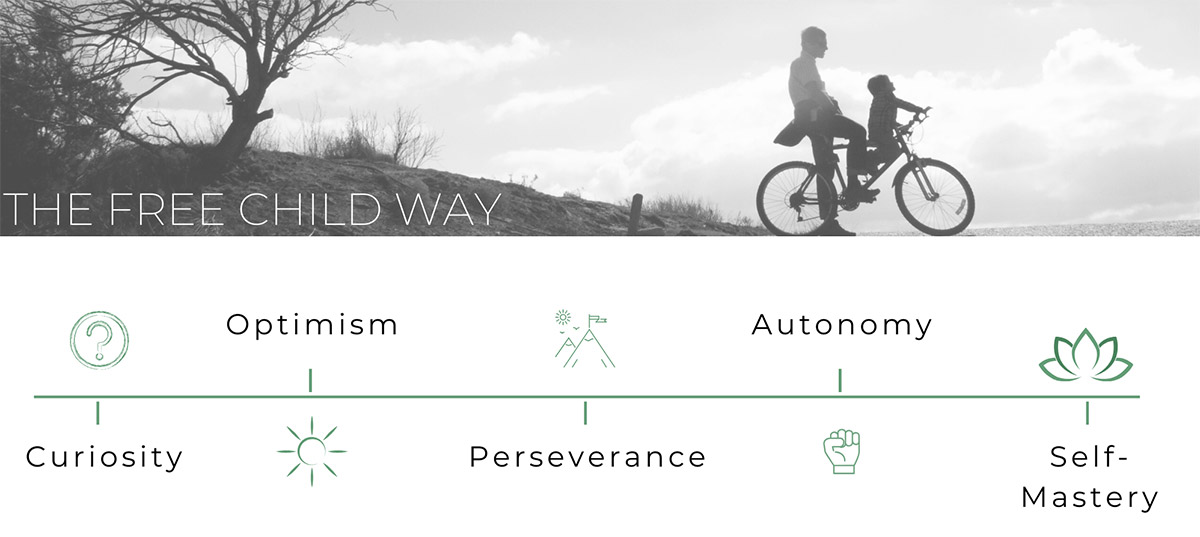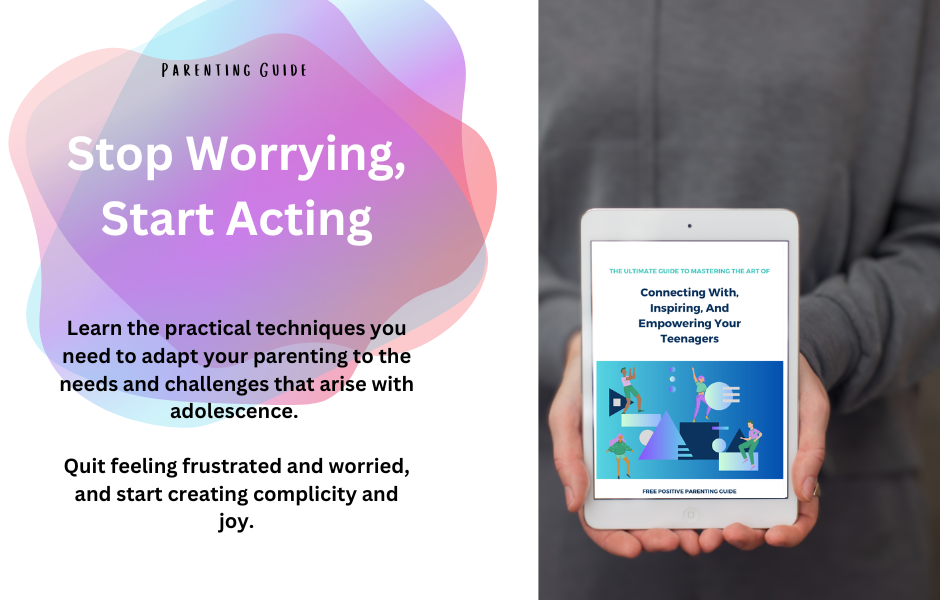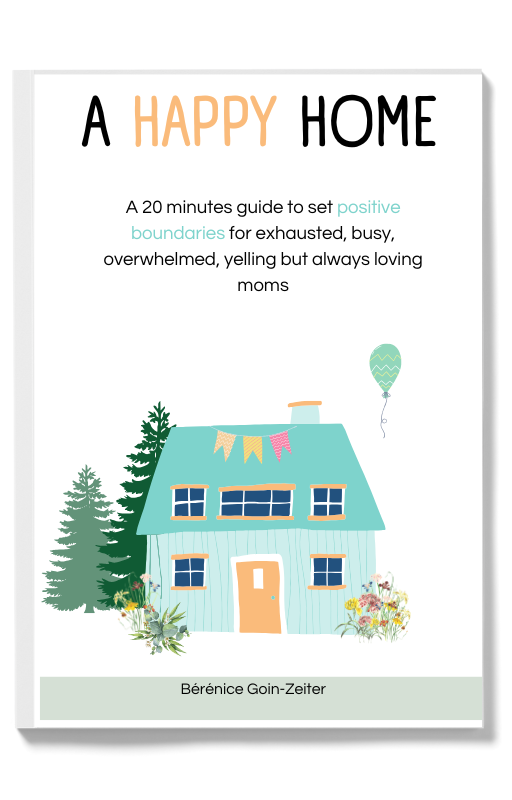
#13 Children Love Boundaries. What About You?
A few weeks back, I told you about children who had taken power in the family. Those children live without boundaries, and if you observe them, you will see that they are not happy. This is not a situation for Emperor children only: children often lack boundaries. Why is that?
A result of misunderstanding the positive parenting message? Laziness to set limits and stick to them? For fear of traumatizing our children?
Don’t have time right now? Download the PDF version
Why Is Setting Boundaries So Hard?
As young as 3 years old, a child is able to obey. That is, his thoughts, will and coordination are developed enough for it. As long as the boundaries make sense to him, that we don’t create them for our own comfort and that he trusts us, a child will obey his parents. Doesn’t sound like insurmountable conditions, does it?
I already wrote about children who had taken the power in the house. Some of you may experience this situation, when from morning until evening, you are submitting to your child’s demands to avoid outbursts. And some of you might experience it from time to time.
We all lived this lonely moment where your child refuses to go to bed, or to eat what’s in his plate, or keeps bothering his sibling and playing when you have to go, making a show at the mall because he wants a toy or in the street for ice cream.
Do you know what are all parents experiencing these situations have in common? They feel guilty. And because they feel guilty they give in. Each time you give in, even for the smallest thing, you tell your child that saying “no”, or throwing a tantrum, gets him what he wants. Makes sense?
A Child Is Happier With Clear Boundaries
Even if I tell you today, even if a thousand child specialists from all over the world would tell you today, that boundaries are GOOD and HEALTHY and make children HAPPIER, maybe you still couldn’t do it. It might be that you’ve heard too many stories of adults in need of psychotherapy because of their parents. Undoubtedly because you want as much happiness as possible for your kids.
[Tweet “#Children are explorers: they don’t see the #goal, they see the #path”]
They experiment in order to understand, they investigate and then they confirm or not their suppositions.
They will have the same attitude towards boundaries. Because a child’s mind is an explorer’s mind. If they can’t find or experiment limits, they’ll keep looking for them. And if their experience show them that yelling, crying, or being stubborn get them ice cream and movies in the evening, they’ll register that as an “experience-that-turned-into-a-success” information.
Limits are great sometimes. Have you ever tried to play hopscotch with no rules at all? What would happen if you were to drive just the way YOU want, no matter what the others do? When you arrive in a new gym, don’t you feel reassured once you know the rules of the place?
Boundaries aren’t about cutting out freedom, they are about giving information. About creating a frame in which it feels safe to move and explore.
– The Earth School
Beliefs Against Boundaries
If you are a regular reader of my blog posts, you must think: “those damn beliefs again!”. Yes, again. Because if your rational mind tells you something (“it is good to set limits”) while your behavior goes another way (“that’s crap, my daughter is happier when she decides everything”), it means you have a belief. A belief strong enough to affect your rational mind and make up fake arguments and justifications.
When we set limits for our child and we see his little face-melting and his big manga eyes watering we feel like tyrants and we back off. Because we want him to be happy. It makes us feel guilty to dictate boundaries.
So what’s the belief here?
That you make your child unhappy when letting him experiencing frustration.
It might LOOK like this is true, but as adults, we have this great ability: aiming for a goal, seeing the bigger picture. It is just the same here. Your goal is your child’s happiness in the long term. His instant satisfaction will never match true, deep happiness. It is like comparing a flower in a vase and a flower bed!
Breaking limits
If you set limits, children can break them. This might sound astonishing but it is healthy too. Not behaving as they wish all the time, but following rules and sometimes breaking them.
It can happen that a young child wants to explore and that his parent’s limits keep him from it. In this case, a baby or young child won’t mind the limits and just do whatever satisfy his curiosity. When this happens, you can wonder if your limit was adapted to your child. Sometimes we have to rethink our limits, and as our children grow the boundaries need to grow along.
Let’s say you’re in a playground and you tell your child that he is not allowed to go out of the playing area. Maybe he’s a very curious 4 years old critter and all this grass with flowers and butterflies is so exciting he just wants to go anyway.
That means that maybe your limits were not appropriate to your child. When limits hinder positive behavior like exploring, gaining autonomy, or helping, they make no sense.
If your child wants to help to set the table but is not allowed to carry glasses because they may break, it is not a healthy boundary. If your child wants to sit on the table during the meal and disturbs the family, it is a healthy boundary to say no. I guess you can all see the difference? In doubt, turn to yourself, to your feelings, your intuition.
A Guide To Limits
Of course, it is quite challenging to set limits as one might wonder which ones are right or not. It depends on your family, lifestyle, and values.
Let’s say you live on a homestead, your children will have completely different boundaries than those of a child living in a city area. It also depends on your children. Some kids need really clear, strict boundaries and need to be reminded of them all the time. Those are usually children with a lack of self-confidence.
Let’s cover some basics about boundaries to help you see clearer.
1. Safety Boundaries
Those are the easiest to implement as every parent knows of their necessity and they mostly call on our common sense. A safety boundary should protect the child but not keep him from developing his autonomy. A child needs to run, climb, practice his balance, swim,… Did you know that most accidents (like falls, broken arms, and bleeding noses) happen when the parents are present? Because they are so worried that the child loses his confidence, or worse, they shout warnings and the child gets scared and falls? Better to go with a “make sure the branch is strong” rather than “careful! You will fall!” It is very very uncommon for a child to do something he is not able to do. Trust them. Safety boundaries could be like: “you have to let me know if you go outside”, “come to say hello every 30 mn”, “you are not allowed to swim in the pool if I am not here”, …
2. Individual Boundaries
Children need tailor-made boundaries. I know, it would be easier if there was a book named “boundaries and limits for the 21st-century child”, but there isn’t.
So, what can you do? Every child was born with a unique temperament: understanding your child’s temperament can definitely help you to set the right limits for him. Let’s take the first characteristic Thomas and Chess identified in their classic study “The Origin of Personality”. This characteristic is the level and extent of motor activity.
If your child has a low motor activity, meaning he can play for hours with his toys but you have to push him to go outside and play, you will not set for him the same limits as for his brother who is just the opposite and can’t sit for more than one minute.
Here, the keyword is observation. Observe your child, get to know him, and set boundaries accordingly.
It definitely means that children of the same family won’t necessarily have the same boundaries. Exception made of the family rules.

3. Family Boundaries
Some rules can be adapted and some can’t. Family life rules can’t. Why not? Because this is where the child will find balance and security.
While some limits can be flexible and the child knows that depending on his attitude, the circumstances, your mood,… they might vary slightly, he will also know that some are immutable. This is very reassuring for your child AND for you.
What your family rules depend on you. In my family, we don’t have so many, but they are important to us and to the children. Just to be clear, those rules are for my children AND for us. You can’t ask something you’re not willing to do yourself, it would be authoritarianism. Here is a couple that comes to my mind:
-
stay seated during meals until all children are done
-
be polite and respectful of each other
-
don’t leave your personal stuff in the common areas
-
help with the meals and other chores
-
take care of your stuff (e.g. bringing your laundry to the laundry basket, drying your wet shoes, tidying your toys,…)
My youngest struggles with the first one, my daughter with the second, and my eldest with the last… Different temperaments!
4. Social Boundaries
Those are the boundaries you set for your children regarding their social interactions. Remember here that giving a good example is worth a thousand words. If you are rude or don’t expect your children to be polite, they will be rude.
While some see their child rudeness as proof of a strong personality, let me tell you, it is not. Being respectful and mindful as a child requires more strength of character than being rude. Being rude means making no efforts.
I don’t know about you, but when I am invited over, I wouldn’t like my kids to help themselves in my friend’s fridge or ask for something else to eat because “this is disgusting”.
Now, I can’t tell you my rules here because I am Swiss and it’s a long list 🙂
But being polite: saying hello, thank you, goodbye, doesn’t seem unreachable to me. As isn’t no shouting when adults are talking, or leaving a mess behind when you’re visiting friends.
Don’t want to lose that? Afraid you’ll forget? Excited to implement?
Download our Cheat Sheet Here!
Children Love Boundaries, Not A Cage
There is no point setting limits for the sake of setting limits. According to what kind of parenting and environment you want to give your child as he grows, you will decide on the appropriate boundaries.
Mine are very loose according to Swiss standards for example. Especially when it comes to my children’s freedom of action. They are allowed to play outside by themselves and go to the playground unsupervised. They go and play in the forest. When we go for a walk they can play with mud, build fires, and use their pocket knives.
I know they need that freedom, and I am happy to give them enough room to develop autonomy. And I feel confident that they won’t break the safety rules of outdoor activities because they don’t need to.
As a consequence, I am a bit worried when they are in the forest and I don’t have an eye on them. But keeping them from going would be setting a limit for my own comfort, and those limits are not healthy. I learned to trust them by giving them more and more freedom and they did show me that they were worth that trust. The rest in on me, it’s my job to work on my fears and not letting them impact my children.
So What About Consequences?
There is no use setting limits if you don’t enforce them. Actually this is worse.
Set a limit and don’t make the consequence stick? It will be a hard and tedious job to catch up with that. This is why you shouldn’t speak too fast and yell some crazy consequences that you can’t hold anyway (sounds familiar?).
Your child is not listening while visiting the zoo? He runs all over the place yelling? If you tell him something like “do that one more time and we go home”, be ready to go home.
It’s always good to take time to think before giving a consequence. You can ask yourself:
-
Does this consequence make sense?
-
Is it proportional to the behavior?
-
Will I be able to stick to it?
-
Could he repair his harm instead? (Always the best choice when available)
When you’re sure, you can tell your child about the consequence. Be very clear and specific. Explain why there is a consequence, what it will be, for how long, what are the conditions…
It’s not “you kicked your brother, go to your room!”. In this case, anyway, I would suggest you choose a repair rather than a consequence: “you kicked your brother and he’s hurt. What can you do to make it better?”. But if the situation requires it you could say something like “you kicked your brother, this is not allowed in our family. I want you to go to your room for the next ten minutes and think about what you did. I will come to speak with you then”.
It is always good, no matter if we’re talking consequence or repairing, to give closure to the incident. So that your child knows it’s all good and paid for, that you are not angry and there is no grudge.
Negative behavior >>> repairing or consequence >>> closure.
Where do you stand about limits? I would be glad to hear about it.
Do you set boundaries? Are they flexible? Which rule is the most important to you? What are the consequences you usually give?

A PDF version of this article?
The Cheat Sheet?
Wanting to join the newsletter to know about the next blog post?
That’s the place!






Don’t Forget To Join Our Community To Get Inspiration And Tips Straight in Your Mailbox
I wish you all the best with your kids. Always remember — we’re all doing the best we can in any given moment, so try not to judge yourself too harshly. Be confident and listen to your intuition. If what you do comes from a place of love, then you’re already on the right path.
If you want more resources, ⬇️ keep scrolling ⬇️
Looking for a way to set boundaries that feel fair for everyone? Here’s your home guide to healthy boundaries.
If your child is or is becoming a teenager, check out our parenting guide for teenagers!








Permalink
Absolutely. There is no point in setting boundaries if children can cross them as they wish 🙂 Though I favor reparation over consequence